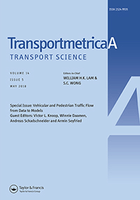
Transportmetrica A-Transport Science
Scope & Guideline
Exploring New Horizons in Transportation Science
Introduction
Aims and Scopes
- Transportation Modelling and Simulation:
The journal extensively publishes research on modeling various transportation systems, including traffic flow, public transport, and pedestrian dynamics, often utilizing advanced simulation techniques and machine learning methods. - Data-Driven Approaches:
A significant focus is placed on utilizing big data analytics, including mobile phone data, GPS data, and crowdsourced information, to inform transportation planning and policy decisions. - Connected and Automated Vehicles (CAVs):
Research on the integration of connected and automated vehicles into existing transportation frameworks is a central theme, exploring their impact on traffic dynamics and safety. - Sustainability and Efficiency:
The journal emphasizes research that contributes to sustainable transportation solutions, including electric vehicles, public transit optimization, and the reduction of carbon footprints. - Human Behavior and Transportation:
Understanding the role of human behavior in transportation systems, including driver and pedestrian interactions, is a core area of research, often employing behavioral modeling techniques. - Policy and Economic Analysis:
The journal addresses transportation policy implications and economic evaluations, focusing on the impacts of regulations, pricing strategies, and service designs on transportation systems.
Trending and Emerging
- Smart Mobility Solutions:
There is a growing emphasis on smart mobility solutions, including ride-sharing, mobility-as-a-service (MaaS), and adaptive public transport systems, which leverage technology to enhance user experience and operational efficiency. - Impact of Connected and Automated Technologies:
Research focusing on the implications of connected and automated vehicle technologies is increasingly prominent, exploring their effects on traffic safety, congestion, and urban planning. - Sustainability and Green Transportation:
Emerging themes in sustainability, such as electric vehicles, bike-sharing systems, and eco-friendly transport policies, reflect a strong trend towards reducing environmental impacts in transportation. - Advanced Data Analytics and Machine Learning:
The application of machine learning and AI techniques for traffic forecasting, demand prediction, and system optimization is surging, indicating a shift towards more sophisticated analytical methods. - Behavioral Insights in Transportation:
Understanding user behavior through psychological and sociological lenses is gaining traction, with research increasingly focusing on how individual and group behaviors affect transport systems.
Declining or Waning
- Traditional Traffic Engineering Methods:
There has been a noticeable decline in the focus on traditional traffic engineering methods, such as basic traffic signal optimization and conventional flow models, as more advanced, data-driven approaches gain traction. - Static Transport Models:
Research utilizing static models for transport demand forecasting and traffic assignment has waned, with a shift towards dynamic and stochastic modeling techniques that better capture real-world complexities. - Non-Integrated Transport Systems:
Studies focusing on isolated transport systems without considering multi-modal integration are becoming less common, as interdisciplinary approaches that address the interconnectivity of transport modes are prioritized. - Empirical Studies of Historical Data:
Research relying heavily on historical data analysis without incorporating modern data sources or methodologies is declining, as the field embraces innovative data-driven techniques.
Similar Journals

Case Studies on Transport Policy
Unveiling the dynamics of transport systems through rigorous analysis.Case Studies on Transport Policy, published by Elsevier, is an influential journal in the fields of transport policy, urban studies, and geographic planning. With its ISSN 2213-624X and E-ISSN 2213-6258, this quarterly journal has consistently maintained a strong impact within its scope, attaining Q1 rankings in Geography, Planning and Development and Urban Studies, as well as a Q2 ranking in Transportation for 2023. The journal provides a platform for high-quality research and practical case studies that contribute significantly to the understanding and improvement of transport systems and policies worldwide. Its rigorous peer-review process ensures that published articles are of the highest academic standard, appealing to researchers, policy-makers, and professionals alike. With a strong presence in several social sciences categories, the journal ranks highly in Scopus, positioning itself as a critical resource for those engaged in the strategic development and analysis of transport solutions. Located in Amsterdam, Netherlands, it aims to bridge the gap between research and real-world applications, facilitating knowledge exchange and innovative strategies in transport policy.
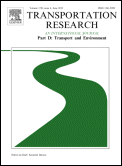
TRANSPORTATION RESEARCH PART D-TRANSPORT AND ENVIRONMENT
Bridging the gap between transportation and environmental science.Transportation Research Part D: Transport and Environment is a premier academic journal published by Pergamon-Elsevier Science Ltd, dedicated to advancing knowledge in the fields of civil and structural engineering, environmental science, and transportation. With an impressive Impact Factor and ranked in the Q1 category for 2023 across multiple disciplines, this journal serves as a critical resource for researchers, professionals, and students interested in the intersections of transportation systems and environmental challenges. Spanning the years from 1996 to 2024, the journal features innovative studies that address pressing transportation and environmental issues, fostering interdisciplinary collaboration and insights. Although not an open-access journal, articles published in Transportation Research Part D are accessible through institutional databases, making significant contributions to academia and practice in the UK and globally. Scholars looking to stay at the forefront of research related to sustainable transport solutions and their implications for the environment will find this journal indispensable.

European Journal of Transport and Infrastructure Research
Fostering dialogue among scholars and practitioners in transport research.The European Journal of Transport and Infrastructure Research (EJTIR) is a premier academic journal dedicated to advancing the field of transport and infrastructure studies. Established in 2000 and published by the EDITORIAL BOARD EJTIR in the Netherlands, this open-access journal promotes the dissemination of high-quality research through a global platform. With an impressive categorization in the Q2 quartile for Geography, Planning, and Development, as well as Urban Studies, and a Q3 ranking in Transportation as of 2023, EJTIR is recognized for its significant contributions to these vital disciplines. It holds commendable Scopus rankings, reflecting its impact and relevance in the social sciences. The journal's objectives include fostering innovative research, facilitating a dialogue among scholars, practitioners, and policymakers, and addressing contemporary transportation challenges. The open access model ensures that research findings are accessible to a wider audience, thereby promoting evidence-based decision-making in transport policies and infrastructure development. Researchers, professionals, and students are encouraged to engage with the journal's content, contributing to the ongoing discourse in this essential field.

Vehicles is a pioneering open access journal published by MDPI since 2019, dedicated to advancing knowledge in the fields of Automotive Engineering and Electrical and Electronic Engineering. Based in Switzerland, the journal provides a valuable platform for researchers, professionals, and students to disseminate high-quality, peer-reviewed research across essential areas of vehicle technology and innovation. With an impressive Q2 ranking in both Automotive Engineering and Electrical and Electronic Engineering as of 2023, and a notable placement in the Scopus rankings (Rank #37/125 and #320/797, respectively), Vehicles plays a critical role in fostering collaboration and knowledge exchange within these fast-evolving disciplines. Through its commitment to Open Access, Vehicles ensures that cutting-edge research is accessible to a global audience, thereby contributing significantly to the collective understanding and development of sustainable transportation solutions. Situated at the crossroads of engineering innovation and practical application, Vehicles invites contributions that explore contemporary challenges and promote transformative advancements in the automotive sector.
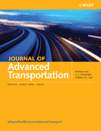
JOURNAL OF ADVANCED TRANSPORTATION
Empowering Global Collaboration in Transportation StudiesJOURNAL OF ADVANCED TRANSPORTATION, published by WILEY-HINDAWI, stands as a pivotal platform in the fields of automotive engineering, computer science applications, economics, mechanical engineering, and strategy and management. With an impressive impact factor and positioned in the Q2 quartile across multiple categories as of 2023, this open-access journal offers researchers, professionals, and students unparalleled opportunities to disseminate and access cutting-edge research. Operating under an open access model since 2017, the journal fosters global collaboration and knowledge exchange, encouraging innovative solutions to contemporary transportation challenges. Its comprehensive scope, spanning converged years from 1979 to 2024, reflects its commitment to addressing the evolving landscape of transport systems worldwide. Researchers from diverse disciplines are invited to contribute transformative studies that advance the field and inspire future endeavors.

PROCEEDINGS OF THE INSTITUTION OF CIVIL ENGINEERS-TRANSPORT
Connecting Research and Practice in Transportation EngineeringPROCEEDINGS OF THE INSTITUTION OF CIVIL ENGINEERS-TRANSPORT, published by Emerald Group Publishing Ltd, is a vital scholarly journal dedicated to advancing knowledge in the fields of civil and structural engineering and transportation. With an ISSN of 0965-092X and an E-ISSN of 1751-7710, this journal has been a cornerstone of academic discourse since its inception in 1992, providing a platform for innovative research and case studies up until 2024. Although it currently holds a Q4 quartile ranking in both Civil and Structural Engineering and Transportation categories, its content aims to bridge gaps in existing literature, making it a relevant source for researchers, professionals, and students alike. The journal offers an array of insightful articles that contribute to the evolution of engineering practices and transportation methodologies, fostering a global dialogue among industry stakeholders. While it operates under a subscription model, the journal remains committed to enhancing public access to pivotal findings in engineering disciplines, driving forward the agenda of sustainable and efficient infrastructure development.
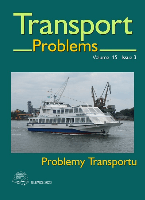
Transport Problems
Navigating the Intersection of Theory and Practice in TransportTransport Problems, published by the Silesian University of Technology, Faculty of Transport, is a distinguished open-access journal that has been advancing scholarship in the fields of Automotive Engineering, Mechanical Engineering, and Transportation since its inception in 2007. With an ISSN of 1896-0596 and an E-ISSN of 2300-861X, this journal serves as a vital platform for researchers and practitioners to disseminate innovative research findings and explore fundamental issues in transport systems and technologies. Based in Poland, the journal covers various topics including transportation logistics, vehicle dynamics, and environmental impacts, thereby addressing critical challenges faced in the transportation sector globally. As reflected in its Scopus rankings, the journal occupies respectable quartiles and continues to contribute valuable insights to the academic community. By making its content freely accessible, Transport Problems significantly enhances the ability of researchers and students alike to engage with the latest developments in transport engineering and contribute to this ever-evolving field.
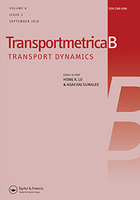
Transportmetrica B-Transport Dynamics
Elevating Scholarship in Transportation ModelingTransportmetrica B: Transport Dynamics is a premier academic journal published by Taylor & Francis Ltd, focusing on innovative research in the fields of transportation dynamics, modeling, and simulation. Established in 2013 and running through 2024, this journal holds a prestigious Q1 ranking in Modeling and Simulation, Software, and Transportation categories, reflecting its commitment to high-quality scholarship. With an impactful presence, evidenced by its Scopus rankings—73rd in Mathematics, 57th in Social Sciences, and 174th in Computer Science—Transportmetrica B serves as a critical platform for researchers, professionals, and students seeking to explore and disseminate groundbreaking findings in transport dynamics. The journal is accessible via open access options, ensuring that its valuable insights reach a global audience. As the field of transport continues to evolve, Transportmetrica B remains at the forefront, championing extensive research and development that address the challenges of modern transportation systems.

IEEE Open Journal of Intelligent Transportation Systems
Advancing Research for Safer Roads.IEEE Open Journal of Intelligent Transportation Systems, published by the IEEE-INST ELECTRICAL ELECTRONICS ENGINEERS INC, stands at the forefront of innovation in the realm of intelligent transportation systems since its inception in 2020. With its open-access format, this journal aims to disseminate groundbreaking research and technology advancements to a broader audience, fostering collaboration and knowledge exchange among professionals in the automotive, mechanical, and computer science engineering sectors. It boasts impressive Q1 rankings in Automotive Engineering, Computer Science Applications, and Mechanical Engineering as of 2023, highlighting its critical role in shaping the future of transportation technologies. The journal's exceptional standing is further evidenced by its Scopus rankings; it holds the 76th percentile in Mechanical Engineering and the 74th percentile in Automotive Engineering, making it a premier outlet for cutting-edge research. Researchers, professionals, and students seeking to navigate the evolving challenges and solutions in intelligent transportation systems will find this journal an invaluable resource.
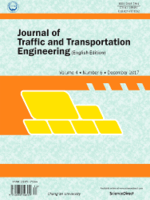
Journal of Traffic and Transportation Engineering-English Edition
Exploring New Horizons in Traffic Management and Transportation Studies.Journal of Traffic and Transportation Engineering-English Edition, published by KEAI PUBLISHING LTD, is a leading open-access journal that has been disseminating valuable research in the realms of civil and structural engineering, as well as transportation studies since 2014. With a robust impact factor reflected by its prestigious Q1 rankings in both Civil and Structural Engineering and Transportation, this journal stands at the forefront of innovation and scholarship, featuring contributions from experts across the globe. The journal is particularly noted for its practical and theoretical advancements in traffic and transportation engineering, making it indispensable for researchers, industry professionals, and students aiming to deepen their understanding of these critical fields. Dedicated to providing a platform for high-quality interdisciplinary research, the Journal of Traffic and Transportation Engineering embraces the principles of open access, ensuring that all published articles are freely available to foster knowledge sharing and collaboration within the community. With its headquarters located in Beijing, China, the journal continues to push boundaries and set new standards in the field of traffic and transportation research.